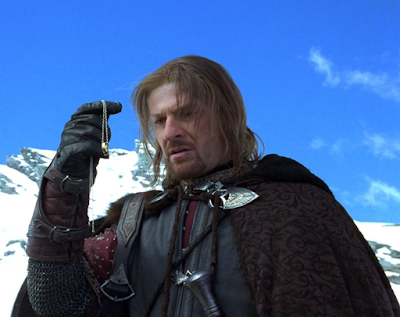You Shall Not Pass!: What Was Gandalf Really Saying?
We all know what happened when Gandalf confronted the Balrog in Moria. We also know his famous words of defiance on the bridge of Khazad-Dûm.
“You cannot pass...I am a servant of the Secret Fire, wielder of the flame of Anor. You cannot pass. The dark fire will not avail you, flame of Udûn. Go back to the shadow! You cannot pass.” (FOTR 370)
But…what did he mean by this. Here I’m going to delve into his words so we can interpret, or at least get a general idea of, what he was referring to.
You Cannot Pass
This phrase is self-evident. Gandalf goal was to protect the company. Stopping the Balrog from reaching them would be the obvious move to achieve this. But did he really think he was capable of conquering it?
To answer that, let’s zoom out a little. Gandalf is a Maia and a member of the Istari, or the Wizards. That might not seem like much since the Balrog could also claim to be a Maia. However, Gandalf had been described in the Silmarillion as being the wisest of all of them, which made him very powerful. Plus, he was the bearer of Narya, one of the Elven rings. This made him an intimidating opponent, even for one as powerful as the Balrog.
Maybe Gandalf also hoped that what he said to the Balrog would be enough to chase it away. Though this sounds ridiculous at first, he might not have been far off from the truth. His words definitely held some meaning for it because the fire died and the darkness grew after he said it.
Both of these could have been likely possibilities but it is also likely that Gandalf simply did it as an act of self-sacrifice. This is supported by his statement when he sees the Balrog.
"What an evil fortune! And I am already weary." (FOTR 370)
He knew that the Balrog would be able to overcome the company in an instant, so he hoped to distract it long enough so that everyone else could get away. Although he undoubtedly knew the risks, he might also have thought he would be able to defeat it and return to the Fellowship, tired but alive.
Servant of the Secret Fire
This one is a little harder. Tolkien never identifies what the Secret Fire was to the best of my knowledge. In order to figure this out, I have taken the liberty of going into hypothetical situations. However, the solutions I’m going to offer you don’t have any textual evidence that I know of.
The Secret Fire could have been the Elven ring, Narya, that he bore. After all, it was secret, and having a red stone meant it was the ring of fire as well. But Gandalf was hardly its servant; in reality, quite the contrary. Therefore, I don’t see this as a viable option.
My headcanon is that the Secret Fire referred to the Flame Imperishable that made up the world. When Gandalf, a servant of Illuvatar, came to Eä, he became one of its protectors as a member of the Maiar. With a little imagination this essentially made him the Servant of the Flame Imperishable and by extension Eru himself.
These are all possible explanations, or the Secret Fire can be something else entirely. I’d love to hear what you think.
The Flame of Anor
This is also a little complicated, but I think it’s easier to figure out. Anor means sun. So when it says the flame of Anor it quite literally means the flame of the Sun. Gandalf could have been referring to his power to create lights and fires, some examples of which are when he split the Bridge soon after he said this and when he chased away the Nazgûl on the Pelennor fields later on.
Personally, I believe he was referring to Narya. He did wield it, and it might have even been the reason he was able to create fires and flashes of white lights in the first place. It would also be likely for Gandalf to warn the Balrog not to mess with him before he would expend his energy. However, it does give food for thought that Gandalf would announce he was a bearer of an Elven ring when the bearers had spent many centuries keeping it a secret.
Flame of Udûn
This is probably the most straightforward of the three. You might recognize Udûn as the region of Mordor by the Black Gate. Although Gandalf definitely wasn’t referring to that, the meaning is the same. Udûn means “hell” in Sindarin, so the region literally translates as “hell”. The elves also referred to Melkor’s fortress, Utumno; where the Balrogs first appeared, as Udûn. So since a Balrog is a demon of flame it makes sense that Gandalf would call it by that and then the place where it came from.
I hope this sheds some light on what Gandalf said. Tolkien never explained it fully which still leaves us guessing today. Sadly, we will never know for sure what Gandalf meant when he spoke to the Balrog on the Bridge of Khazad-Dûm.
Works Cited
Tolkien, J.R.R. The Fellowship of the Ring 1955. Del Rey. Date Accessed Feb 10, 2019.
Tolkien, J.R.R. The Silmarillion. 1977. Del Rey. Edited by Christopher Tolkien. Date accessed
Feb 10, 2019.


Love your blog!
ReplyDelete